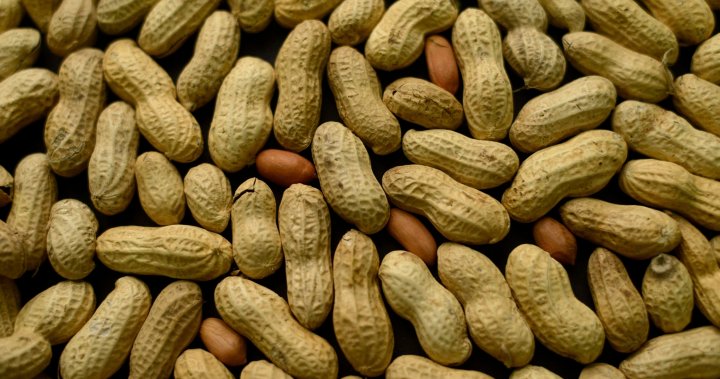A decades-old asthma medication may help reduce the severity of allergic reactions for those suffering from food allergies, a new study found.
The study, published Sunday in the New England Journal of Medicine, said that Xolair (also known as omalizumab) helped even the youngest sufferers, aged just one year, with multiple food allergies. After 16 weeks of treatment, the drug outperformed the placebo in boosting tolerance levels for peanuts and other common food allergens.
The Standford-Medicine-led study argued that regular use of the drug could protect people from severe allergic responses, such as difficulty breathing, if they consume trace amounts of allergenic foods, such as peanuts, milk, eggs and wheat.
“This is big news for the food allergy community,” Jennifer Gerdts, the executive director of Food Allergy Canada, told Global News. “This is the first approved treatment in the U.S. … one would hope that Canada will follow that direction.
“This is a long time coming. Finally, we’re getting somewhere… being able to support people with food allergies with a treatment option.”
Xolair was first approved as an allergy medicine in the United States in 2003 and then in Canada one year later. But now the drug is coming under renewed spotlight for its potential in the realm of food allergies.

On Feb. 16, the U.S. Food and Drug Administration (FDA), approved Xolair for food allergies in certain adults and children one year or older for the reduction of allergic reactions, including reducing the risk of anaphylaxis. The department cited the study as proof of the drug’s efficacy.
The drug, made by Novartis, has not been approved for this specific use in Canada yet.
In an email to Global News on Monday, a spokesperson from Health Canada said Xolair is indicated for adult and pediatric patients with moderate to severe persistent asthma. It is also recommended to treat chronic rhinosinusitis with nasal polyposis and chronic urticaria (hives).
“The safety and efficacy of Xolair have not been established in other conditions,” the spokesperson said, adding that to date, Health Canada has not received an application from the manufacturer to request additions of indications to the use of Xolair.
More than three million Canadians suffer from allergies, and there is no cure, according to Food Allergy Canada. Some allergies may be mild and lead to itching or sneezing, while others may have more severe reactions such as difficulty breathing, swelling of the throat, or anaphylaxis, which can be life-threatening.
The latest health and medical news
emailed to you every Sunday.
In terms of treatment options, Gerdts said the only option that exists in Canada is oral immunotherapy. This approach requires patients to ingest small amounts of their allergen gradually, aiming to enhance their tolerance levels. However, this method is very time-consuming, she added.
Xolair works by binding to and inactivating the antibodies that cause many kinds of allergic diseases, explained Mariam Hanna, a pediatric allergist and clinical immunologist at McMaster University, in Hamilton, Ont.
“We’ve known for quite a bit of time that in patients with moderate to severe allergic asthma, this kind of medication can be used,” she told Global News. “Oftentimes these biologic-type medications, they work at a certain area in this cascade of allergy reactions that are occurring that if you block them, you not only help with one disease, but you may help with other allergic diseases.”
Due to Xolair’s proven effectiveness in managing different allergic conditions, such as hives, experts in the field have long speculated about its potential in addressing food-related allergic responses.
What’s new, Hanna said, is that this is the first large-scale clinical trial that shows its effectiveness in helping those with severe food allergies.
“Patients impacted by food allergies face a daily threat of life-threatening reactions due to accidental exposures,” the study’s lead author, Dr. Robert Wood, a professor of pediatrics at Johns Hopkins University School of Medicine, said in a Sunday media release.
“The study showed that omalizumab can be a layer of protection against small, accidental exposures.”
To find this data, the researchers looked at 177 children with at least three food allergies each over a period from September 2019 to November 2022. Among them, 38 per cent fell within the one to five-year-old bracket, 37 per cent were aged six to 11, and the remaining 24 per cent were 12 years or older.

Two-thirds of the participants were randomly assigned to receive omalizumab injections, and one-third received an injected placebo; the injections took place every two to four weeks over 16 weeks. The participants were then re-tested between weeks 16 and 20 to see how much of each allergy-triggering food they could safely tolerate.
After undergoing re-testing, a majority of patients (66.9 per cent) treated with omalizumab demonstrated increased tolerance, being able to consume at least 600 mg of peanut protein — equivalent to two or three peanuts — compared to 6.8 per cent per cent of those who received the placebo. A similar improvement was seen in reactions to other foods examined in the study.
The study found that around 80 per cent of patients taking omalizumab were able to consume small amounts of at least one allergy-triggering food without inducing an allergenic reaction, 69 per cent of patients could consume small amounts of two allergenic foods and 47 per cent could eat small amounts of all three allergenic foods.
Omalizumab also did not cause side effects, other than some instances of minor reactions at the site of injection, the researchers said.
Although the results of the study are promising, the researchers acknowledge that more data need to be collected to help understand how omalizumab could help people with food allergies.
For instance, there are still unanswered questions regarding the duration of treatment required, the drug’s impact on the immune system, and the factors that determine the strength of individuals’ responses, the researchers noted.
The ‘paradigm is changing’
While Xolair’s use in Canada remains restricted to asthma management, Gerdts and Hanna hope the approval will soon make its way to Canada.
“The paradigm is changing, and this could be a treatable condition, and to the community that’s impacted that offers great hope — tremendous hope,” Gerdts said.
“Now can you turn around tomorrow and get this? No. Is it right for everyone? No. There are lots of conversations needed around who the right patients for this are. How does it get paid for? How does it get approved in Canada? There are so many things that need to be worked out, but it does provide us with, great hope,” she said.

Hanna explained that currently, the medication could be prescribed off-label, but emphasized that this decision should be made through a discussion between the patient and their doctor.
In an email to Global News, Health Canada said using a drug outside of its approved indication is considered off-label use, and is at the discretion of the health-care professional.
Hann stressed that Xolair is not going to be a treatment that is used for every single food-allergic patient, just like oral immunotherapy isn’t.
“But I definitely see a niche for it in patients that have multiple food allergies when they’re about to go off to college or university,” she said. “I think it will become a tool in our toolbox for what we use in our other patients.“










